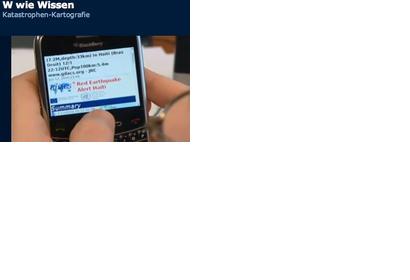On 7 February 2010, UN-SPIDER appeared in the “W wie Wissen” educational programme run by the German ARD TV network. The entire show zoomed in on the 7.2 magnitude earthquake that struck Haiti on 12 January 2010, leaving a trail of utter destruction and devastation in its wake. National governments, military and nongovernmental organizations rushed the humanitarian assistance to Port au Prince immediately after the earthquake. However, securing fast and efficient response and recovery missions, as well as an effective and timely distribution of aid, required the provision of up-to-date space-based information and satellite imagery. At this point the programme drew attention to the work and role of UN-SPIDER.
In the ‘Disaster Cartography. Disaster Management Support via Satellite’ feature of the programme, the importance of the UN-SPIDER involvement in the Haiti earthquake response phase was highlighted, depicting the primary basic workflow that followed the tragedy. It took the viewer through a quick synopsis ranging from the first telephone contact with the UN DFS Cartographic Section to the activation of the International Charter Space and Major Disasters, before moving on to an overview of the rapid mapping procedure at the German Space Agency (DLR) in Oberpfaffenhofen. The role of UN-SPIDER in raising awareness about the importance of satellite technology in disaster management was also brought to the fore throughout the programme. Indeed, during the management of the response to the Haiti earthquake, one of “the tasks of UN-SPIDER was to gather all available satellite imagery of earthquake struck regions to improve the speed and efficiency of humanitarian assistance on the ground”.
The programme also included an interview with Mr. Lóránt Czárán, Head of the UN-SPIDER Bonn Office, who outlined the importance of satellite images when it comes to saving lives and ensuring faster and more efficient recovery.
“W wie Wissen” link: http://www.daserste.de/wwiewissen/beitrag_dyn~uid,is9an39tp5o2q35x~cm.asp
Video link: http://mediathek.daserste.de/daserste/servlet/content/3782468?pageId=&moduleId=427262&categoryId=&goto=&show=

